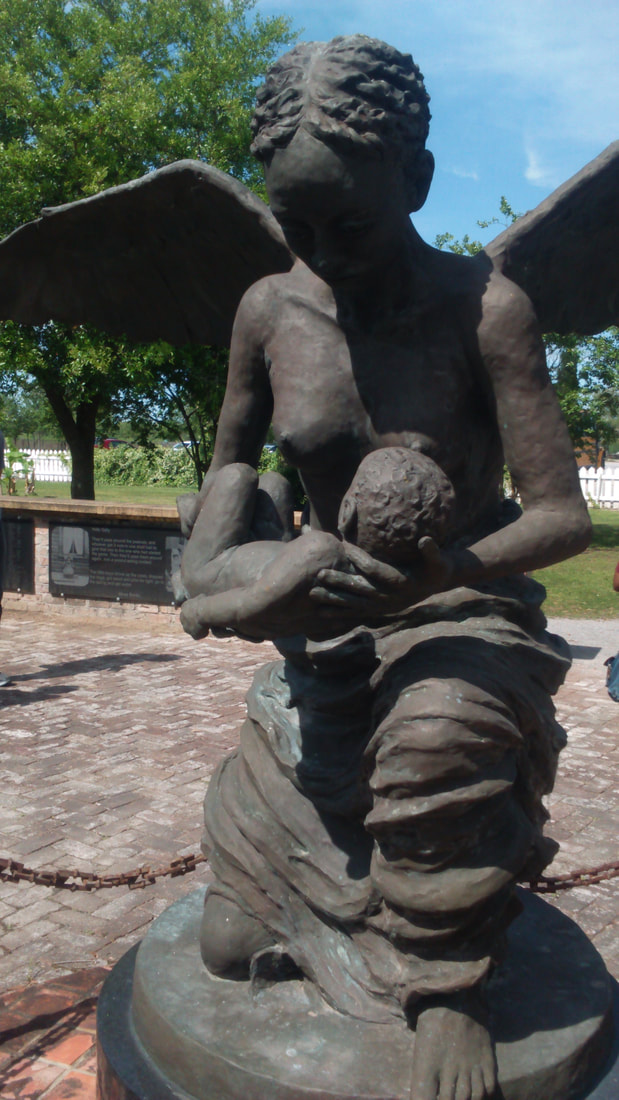This bronze sculpture of a black angel carrying babies to Heaven sits in the Field of Angels at the Whitney Plantation, St. John the Baptist Parish, Louisiana. She watches over the memorial to 2,200 babies who died in St. John the Baptist Parish whose names are recorded in the Sacramental Records of the Roman Catholic Archdiocese of New Orleans. Doubtless there are many more babies whose little lives and deaths were never recorded. This picture or indeed these words cannot communicate the aching love and sorrow expressed by the artist Rod Moorhead in this work.
It is right and fitting that the babies and children be recognised. It is right and fitting that we should mourn them and bear witness to their suffering and the suffering of their mothers and fathers and siblings. They lived and died in a world where childhood was perilous for all, but these children were enslaved and stood little or no chance of survival. In a world of plenty they starved and sickened and died. The Christian charity preached from every pulpit did not extend to them.
To me, this journey to the Whitney Plantation was a pilgrimage, a long spiritual journey to a sacred place. It had the same significance as a journey to the Wailing Wall of Jerusalem, a Holocaust Memorial, or a Famine Graveyard might have for others. I wanted to bring flowers as Irish people do when they visit family graves but I was too shy to ask permission.
The plantation is quiet now and not the busy, bustling place it once was. When it was a working plantation there was noise from the kitchen and the blacksmith's forge. Bells rang calling people to work and eat and to witness the whippings meted out to their family members. Fires crackled underneath sugar cane being cooked and everywhere the cracking of whips as people were driven to work harder and faster, beyond endurance. People wailed in pain and called out for death, while others were numbed into silence by exhaustion and hopelessness. Others sang as they worked and in their singing expressed the only freedom they were allowed.
Our guide who is a descendant of the enslaved people on the Plantation spoke movingly of what it means to her to be part of this memorial to the suffering of her people. She invited us to ring the bell in honour of them. I took my turn with a choked throat. As the sound of the bell rang out, I remembered the bells of my childhood and could see no further than that image of Jesus hanging hopeless on the cross. I wanted to reach out to the black family on our tour but I had nothing to say that would not seem to minimise their loss. I do not know how they endured the walk through the lives and deaths of their own people. i was horrified at some of the comments of the white members of our tour. I desperately wanted them to stop speaking. I listened in awe as our guide answered each question with so much dignity, clearly searching for the words that might enlighten.
As she did this, I remembered again my purpose in coming to the Whitney. I was there to bear witness and to walk alongside my sisters and brothers of colour. To bear witness means to show that something is true, to show that something exists. Those who suffered and died during slavery are people. They existed. Some of them are my blood relatives. To walk alongside means to say 'I see you....I see your pain.' It also means I will not turn away from your pain, though there is nothing I can say or do that will fix it. I will not pretend that slavery is an evil way of life that ended in 1864. I will not close my eyes to the fact that there are now more people of colour incarcerated in the United States than were enslaved before 1864. I will stay awake to the fact that my white skin gives me privilege of which I was once completely unaware. I will speak with my daughters, my family and my friends about what I have learned. In my own clumsy and sometimes ill-educated way, I will do what I can, when I can.
I will never forget my journey to the Whitney Plantation. Truthfully and with no attempt at dramatics, something changed inside me and I will never be the same again. My sincere thanks to John Cummings, Dr. Ibrahima Seck, Cheryl, and all those who have worked to provide a space for us to learn and mourn. May your work continue to be a light in the darkness and grow from strength to strength.
whitneyplantation.com/index.html
If the work of the Whitney Plantation has meaning for you there are many projects which could use your help. The project I contribute to is The Beyond Kin Project.
You too can Make an entry in the Beyond Kin Project Directory
or Create a Beyond Kin Family Tree
Join us on Facebook where you will be warmly welcomed.

 RSS Feed
RSS Feed